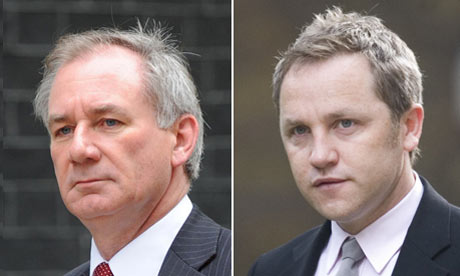Brown defends Hoon and Purnell in capital gains tax row
Prime minister says expenses cases are different to behaviour of Hazel Blears, which he has called unacceptable
- guardian.co.uk, Thursday 21 May 2009 13.02 BST

Geoff Hoon and James Purnell. Photograph: Stefan Rousseau/PA/ Rex Features
Gordon Brown today defended two cabinet ministers accused of not paying capital gains tax (CGT) on the sale of their second homes.
A spokesman for the prime minister said the transport secretary, Geoff Hoon, and James Purnell, the welfare secretary, had acted "in a way that was both consistent with the spirit of the law and the letter of the law" when selling property in recent years.
And in an interview with BBC News, Brown said: "[Hoon and Purnell] have made their statements, they have said what they have done.
"As far as I know, there is no problem that needs to be dealt with."
Brown was responding to a report in the Telegraph today which said Purnell did not pay CGT when he sold a flat in London in 2004 and that Hoon did not pay the tax when he sold his home in the capital in 2006.
Homeowners do not have to pay CGT when they sell their main residence.
But earlier this week, Brown said it was "totally unacceptable" for the communities secretary, Hazel Blears, to sell a flat in London that was funded through the parliamentary second home allowance without paying CGT.
Blears, who did not break the law because she had designated her London flat as her main home for tax purposes, accepted last week that her behaviour appeared unethical and belatedly paid £13,000 to HM Revenue and Customs to cover the tax liability.
Although all three cases involve CGT not being paid, Brown believes Blears' situation was different because it involved her designating the same property as her main residence for tax purposes while it was simultaneously designated as a second home in relation to parliamentary allowances.
The prime minister's spokesman today said Hoon and Purnell had given detailed explanations of why they did not pay CGT and that they had both taken advice on the matter from HMRC.
"The prime minister considers that they have both acted in a way that is consistent with the spirit and the letter of the law," the spokesman said.
He said there was no capital gains liability on either transaction.
In a statement, Hoon said he rejected "any suggestion of any wrongdoing" in relation to the sale of the home he owned in London.
He said he had been "assiduous" in ensuring the he met his reporting obligations and tax liabilities.
Hoon said he bought the property, in Kennington, before he became an MP.
When he became a minister in 1997, he had to nominate it as his main home under the ministerial code and he treated it as his main home for House of Commons, tax and local authority purposes until he moved into Admiralty House in 2002, when he was defence secretary, for security purposes.
"The [Kennington] property was not designated as my residence for any purposes whatsoever during the period I lived in Admiralty House because, from time to time, it was rented out," Hoon said.
"A full disclosure was made to the Inland Revenue and all tax liabilities were properly paid.
"In 2006 [after he had stopped being defence secretary], the property was sold.
"A full tax declaration was made on my behalf by a reputable company of chartered accountants. They advised – and this was agreed by the Inland Revenue – that there was no liability for capital gains tax."
A spokesman for Purnell said: "When he bought his constituency home [in Manchester in 2002], the sale of his London flat fell through, but it was sold within the period that HM Revenue and Customs continue to treat it as not being liable for CGT.
"No one pays CGT when they sell the only house they own, and James was not liable for capital gains tax on his London flat.
"This would have been true for any taxpayer – there was no special treatment.
"To be absolutely clear that he was paying the right tax, James sought advice at the time that the rules were the same for an MP as for any other taxpayer, and he has since contacted the HMRC to ask them to double-check his calculations. HMRC have confirmed that there is no CGT to pay."
Homeowners have a three-year window after moving into a new home during which they do not have to pay capital gains tax on the sale of the old property.
- guardian.co.uk © Guardian News and Media Limited 2009
No comments:
Post a Comment